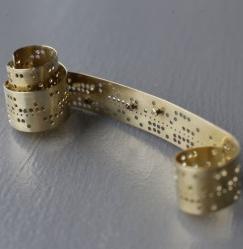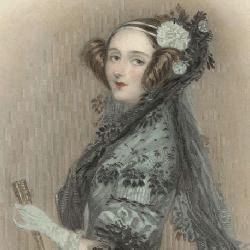| Women In STEM Receive Awards On Ada Lovelace Day 2016 |
| Written by Sue Gee | |||
| Tuesday, 11 October 2016 | |||
|
Today, October 11 2016 is being celebrated as Ada Lovelace Day with initiatives designed to raise the profile of women in science and technology. This annual event is now well established as: an international celebration day of the achievements of women in science, technology, engineering and maths (STEM). It aims to increase the profile of women in STEM and, in doing so, create new role models who will encourage more girls into STEM careers and support women already working in STEM. While Ada Lovelace was chosen to be the symbol of this effort to inspire women but the choice of date isn't related to any events in Ada's life. Instead, the first Ada Lovelace Day was held on March 24th 2009 and since then the second Tuesday in October has been the choice. The main public event taking place in the UK today is ALD Live. This flagship event for the organization that runs Ada Lovelace day takes the form of a "science caberet". This year it is being held at the Institute of Technology and Engineering (IET) in London and is described as: an entertaining evening of geekery, comedy and music suitable for everyone over the age of 12. Also timed for Ada Lovelace Day is an awards ceremony for an initiative for encouraging women into science and then to reach senior leadership roles from the Medical Research Council (MRC) Clinical Sciences Centre at Imperial College London. This is an extension to its existing Suffrage Science scheme, formed five years ago, which already has two sections, for Life Sciences and Engineering and Physics. The third specialism, Maths and Computing, is launched on this Ada Lovelace Day with an event at Bletchley Park where awards will be made to the following 12 recipients in four categories: Mathematics: Computing: International Research: Communications: The awards are two items of jewellery. The first is a golden brooch punctured with holes that encode a secrete message, reminiscent of the tape used to store computer data. The second, a silver bangle, also holds a secret. Engraved on the inside, and hidden beneath a layer of silver, is what many mathematicians consider the most beautiful equation in mathematics, Euler’s equation. After two years, the 12 winners hand on their jewellery to a recipient of their choice, at an awards ceremony. This scientific “relay” creates an ever-expanding cohort of talented women with a connection. Handing on the Suffrage Science jewellery is a vote of confidence by one woman for another. This resonates with the Suffragette movement for votes for women, from which the scheme draws both its name and its inspiration. The twelve winning women plan to make a real difference for the next generation. Professor Ann Blandford, who researches human-computer interaction says she is a leading computer scientist who also happens to be a woman, and this embodies her vision of the future: “For me it’s about making it normal for a woman to be in computer science.” Many of the awardees have overcome gender-specific barriers to excel in their research. Professor Christl Donnelly recounts: “I did once introduce myself to someone from industry who thought I was a waitress. I don’t think that would have happened to a man if he had approached a male counterpart.” So what do these two events have to do with Ada Lovelace? The answer comes from Gibson Square Media, publishers of Ada's Algorithm: How Ada Lovelace Launched the Digital Age through the Poetry of Numbers. To mark the publication today of the book's new edition, which is today's book review, Lila Kwederis writes: While women only represent 26 percent of IT workers, and just ten percent of the cyber security workforce, it was in fact a woman who, back in 1843, had the most remarkable of insights into what a computer would be, how it would work and the potential a computer would have for transforming society. That woman was Ada Lovelace, who was born on December 10 1815 as Ada Byron, the only child of a most unfortunate marriage between Lord Byron and a rather confused, naive and equally spoilt young lady, Annabella Milbanke. Lady Byron, terrified that Ada might grow up like Byron, designed a curriculum for Ada based on teaching mathematics. [She] also introduced Ada to men of science – as opposed to the arts or in society – in London and on Wednesday June 5 1833, when Ada was just seventeen years old, at a party in London, she met the mathematician and polymath Charles Babbage. Babbage had borrowed from the Jacquard loom the idea of using punched cards to store data and also control an ‘Analytical Engine’: these punched cards were comparable to the punched cards used from the mid-twentieth century to input data into computer programs. Ada Lovelace wrote for this ‘Engine’ (which was never built), its first computational programme. But Ada, as Alan Turing would recognize a century later, actually saw much further than Babbage what a working computer would really do: that it could control all kinds of social processes, not just mathematical ones, and even compose music. Today ... it is worth considering how our lives would be different if the scientific ideas of women had not been regarded with disrespect as a matter of course in the nineteenth and early twentieth century. To know more about how Ada Lovelace came to be the world's first programmer through her association with Charles Babbage and his Analytical Engine and how she was the person to foresee what impact such technology could have, also read Ada Lovelace, The First Programmer, I Programmer's own account of her remarkable history and its link to today's celebration.
More InformationCelebrating Women in Science on Ada Lovelace Day 2016 Related ArticlesAda Lovelace, The First Programmer
{loadposition signup)
Comments
or email your comment to: comments@i-programmer.info |
|||
| Last Updated ( Tuesday, 13 October 2020 ) |



